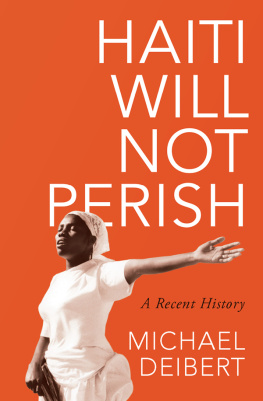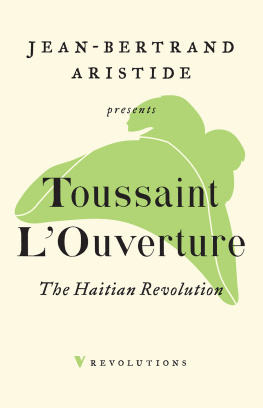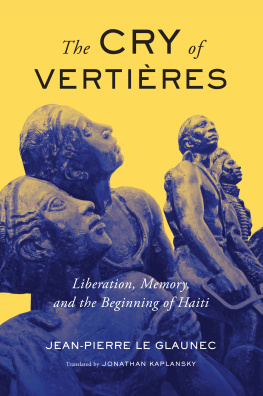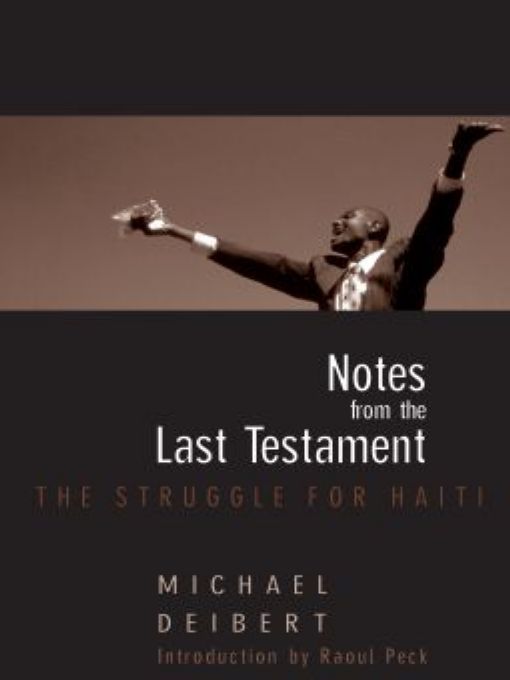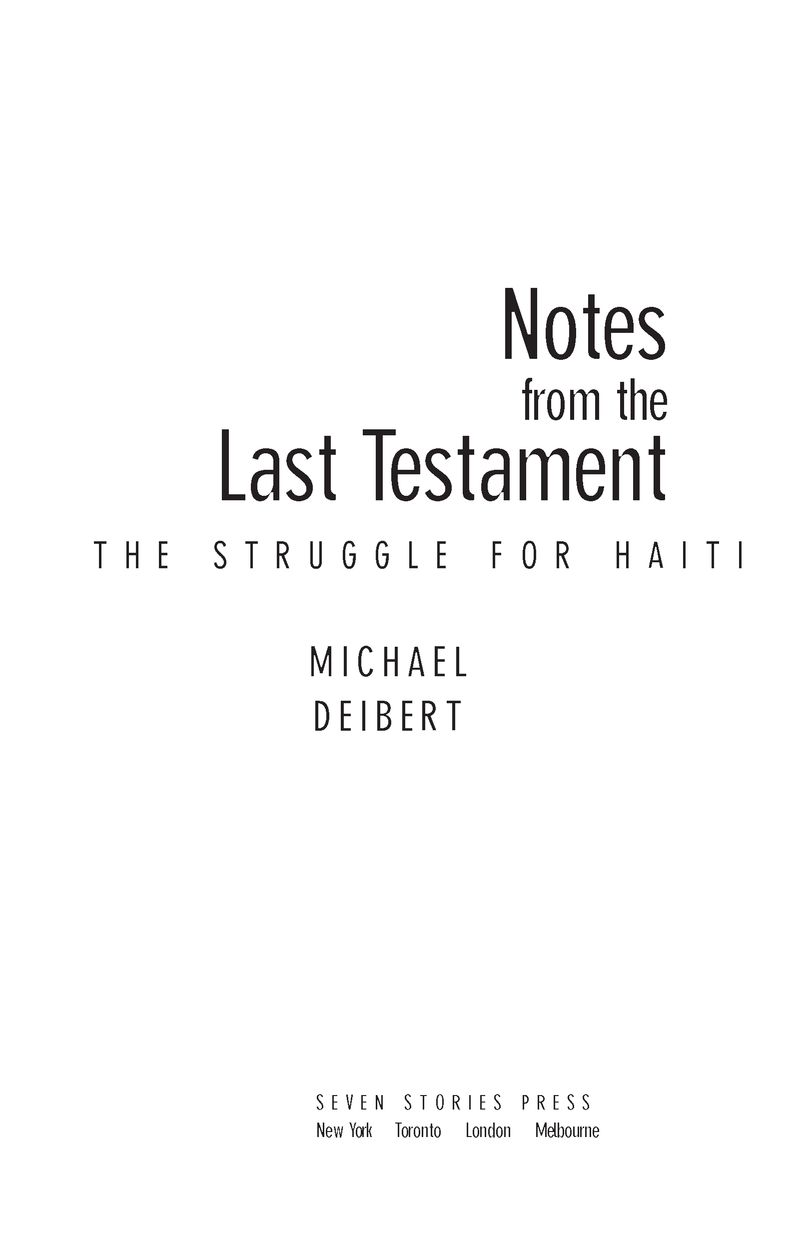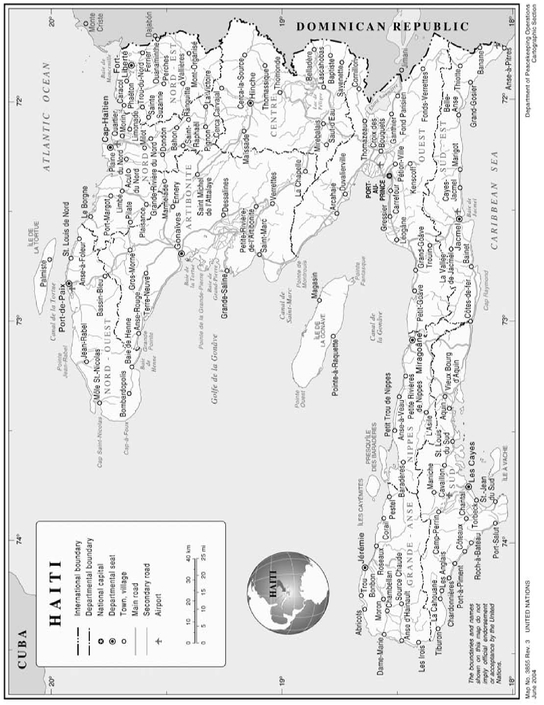Table of Contents
This book is dedicated to the memory of two journalists who I never met, but who gave their lives so that the story of what was happening to the people of Haiti should be known, Jean Dominique and Ricardo Ortega; to the memory of one I did know, Jacques Roche; and to the memory of my grandmother, Leah Maude Breon.
Acknowledgments
THERE HAVE BEEN MANY PEOPLE whose presence in my life served as an inestimable asset to getting this book written.
Chantal Regnault, who patiently shared her accumulated years of experience with this turbulent, beautiful place. Nina Clara Schnall, who first lead me into a world of Haiti behind that of the headlines, a world of many, many people who didnt often get the opportunity to talk with journalists, but whose courage formed the heart of my experience there. Herby Metellus, maker of necklaces and provider of friendship in the lakou of figi beton, and Madame Claudette, who worried for her son as any mother would when he would go out with me.
Doctor Frantz Large, and Tacha and Ronschy and Menno, provided a boisterous family to keep me company during my long time away from home, and Frantz, especially, provided the intellectual companionship and sparring that kept me sane during long months of seeming madness.
Etzer Pierre, painter, musician and thoughtful gwo chef of ENARTS, provided measured context and fine company at vodou ceremonies, carnivals and demonstrations for many years.
James Petit-Frere, Junior Millard, Winston Jean-Bart and the people of Cite Soleil never asked to be born in the worst place in the world, and had much higher and more noble ideas than the political actors who cynically used them. This book is a tribute to their stolen youth and idealism as much as it is to anything.
Gerry Hadden of National Public Radio proved an invaluable traveling companion and friend, and I will always smile at the memory of our journeys to nightclubs in Gonaives, marches in Port-au-Prince and soul-searching late night talks on the roof of the Hotel Montana. David Gonzalez of the New York Times realized when it was time to break with expectations and admit to ugly truths. Alex Smailes was a fearless partner and great photographer who sensitively documented the experience of a people in the throws of great upheaval and, like me, wondered why more of the world didnt seem to care. I will join you for Trini Carnival one of these days, mate. Marika Lynch from the Miami Herald provided a sensitive sounding board for many of the issues discussed in this book. Amy Bracken of the Associated Press worked hard and still found time for languorous lunches at Trois Decks in the hills of Fermathe. Jim Rupert, Tina Susman and Kayne Rogers at Newsday and Anna Szeterenfeld at the Economist Intelligence Unit proved themselves to be thoughtful, dedicated editors.
Ben Fountain, the Texas author whose travels took him to Haiti over the years, provided encouragement when I sorely needed it, kept at me to keep going and dispatched wise advice within sight of the storied Oloffson pool. Guy Antoine imbued me with the love he feels for his homeland and the generosity he feels towards its people. Patrick Moynihan and his family and the staff of the Louverture Cleary School opened their doors to me and the revivifying gift of belief in the future. Cassio Leite Vieira and his family provided me with a lovely apartment in Rio de Janeiro, where much of this book was composed. George Mrer at Seven Stories Press kept pushing to bring this book out until he finally met with success. Raoul Peck lent his voice of support to a young author he had never met, and I owe him a great debt of gratitude for that.
My friends in New York stood by me through poverty and difficulty while I chased this story and this book through the years: Sebastian Quezada, Douglas Young, Philip Schnell, Kevin McCaffrey, Antonia DAmato and Nomi Prins. Further afield, Sutton Stokes, Meli Glenn, Monica Campbell, Justin Cappiello and Eirin Mobekk.
Laura Parker shared the upheaval of the last days of the Aristide regime with me in a time I dont think either of us will ever forget.
Ettore di Benedetto and Javier Henrnandez of the international missions to Haiti all contributed to the success of the project in their own way. Anne Fuller contributed a series of essential interviews from Saint Marc and helped immeasurably with often difficult Kreyol translations.
The Trimble family gave me a place to stay and hot food to eat during some of Haitis most chaotic days.
Madame Brunette Tondreau was a dignified, trustworthy and irreplaceable part of my household.
Richard Morse and the staff at the Hotel Oloffson provided me with a retreat that often vibrated with the joy of Haiti when that joy was in short supply.
Jorgen Leth entertained me with sparkling dinner parties at his fantastic house in Jacmel and shared cigars and political conversation deep into the tropical night.
The bloodied but unbowed Haitian press corps taught me what real grace under pressure was all about: Rotchild Francois, Wendell Theodore, Naomie Calixte and Goudou Jean Numa from Radio Metropole, Roosevelt Benjamin from Radio Signal FM, Pierre Richard from Reuters Television, Thony Belizaire from Agence France Presse, Daniel Morel and Jane Regan from Wozo Productions, Gotson Pierre from AlterPresse and Michele Montas and the entire staff of Radio Haiti-Inter. Jan Voordouw, Jean-Claude Louis and Nicole Simon at the Institute Panos were always there with a free computer to write on and ready smiles of welcome even after the roughest of days on the streets.
Pierre Esperance and the staff of the National Coalition for Haitian Rights in Port-au-Prince were flickers of hope in a darkness that sometimes seemed to threaten to envelop us all.
My grandparents, James and Leah Breon and Joseph and Elizabeth Deibert, brought to me the accumulated wisdom of their years. My father, Caleb Deibert, perhaps put the first seed of travel in me with the knowledge of his early days in Argentina.
My brothers, Benjamin Deibert and Christopher Deibert, have never failed to make me very proud, and my mother, Jann Deibert, taught me more than a little something about the value of perseverance.
Michael Deibert
New York City, June 2005
We had fed the heart on fantasies,
The hearts grown brutal from the fare;
More substance in our enmities
Than in our love; O honey-bees,
Come build in the empty house of the stare.
William Butler Yeats, The Stares Nest by My Window
Introduction
WITH NOTES FROM THE LAST TESTAMENT, Michael Deibert has entered the long tradition of chroniclers of the history and politics of Haiti. Seductive and mysterious Haiti that, from Graham Greene to Anna Seghers, and Bernard Diederich to Amy Wilentz, has never ceased to fascinate either the occasional visitor or the one who will never let go. A country that will bruise you with its excesses, and still hold you hostage through the vitality, the endurance, the fantasies, the beliefs and the contradictions of its people. From its discovery on, Haiti was swept up in a political, social and economic whirlwind, and has been punished by its history. Many have tried to capture its mysteries only to create others along the way, have tried to explain its vibrations, only to fall prey to easy exoticism, have tried to rationalize its tragedies only to over-simplify them.


